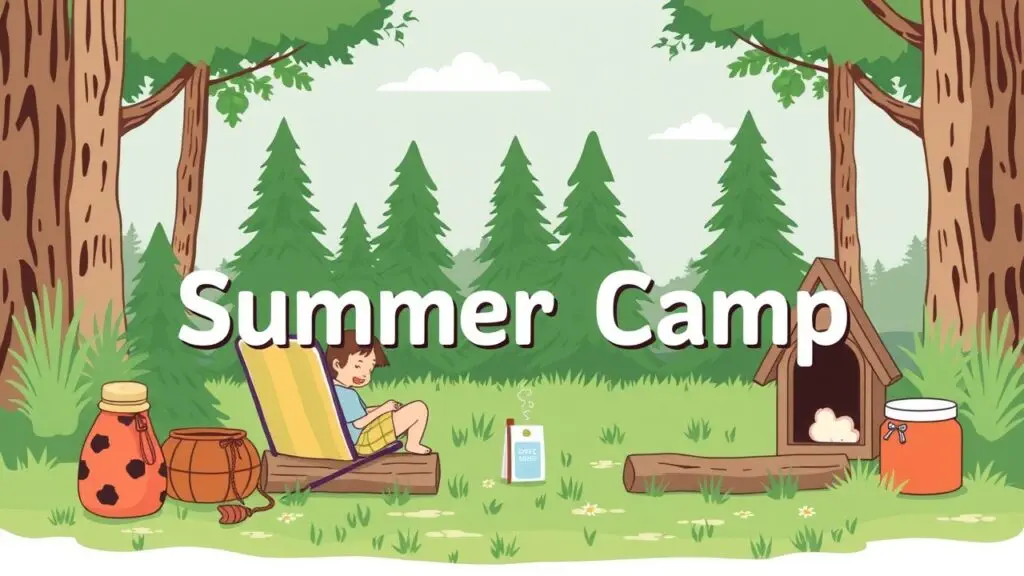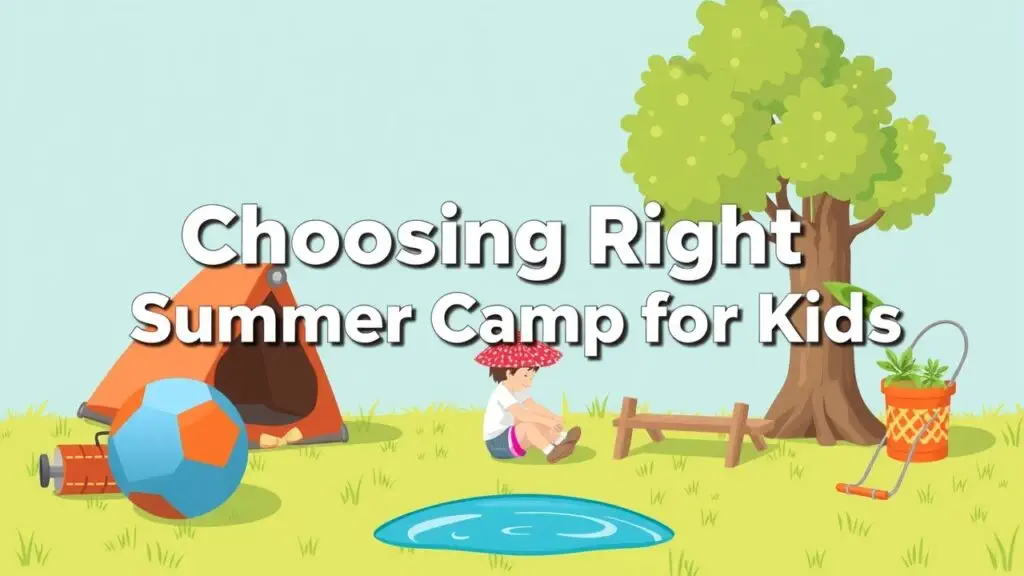Types of camps vary widely; choose from summer, day, overnight, and specialty camps based on your child’s age and interests. These camps offer diverse experiences across the U.S.A.
What are Summer Camps?

Summer camps are fun places where kids and teens can enjoy activities during their summer break. These camps come in different types, like day camps, overnight camps, and specialty camps.
- Day Camps: These run during the day, letting kids return home each evening. Activities can include sports, arts and crafts, swimming, and games.
- Overnight Camps: Also known as resident camps, these last several days or weeks. Campers live at the camp and join activities while away from home.
- Specialty Camps: These focus on specific interests, such as sports (like soccer or basketball), arts (like music or theater), science, technology, or outdoor skills like rock climbing.
Children’s camps are available for all ages and interests, ensuring there’s something for everyone.
Why Choose the Right Camp Type?
Choosing the right camp is very important for your child’s growth and happiness. Each type has its own benefits:
- Social Skills Development: Camps help kids make friends and work together.
- Skill Building: Specialty camps focus on talents or hobbies.
- Independence: Overnight camps encourage kids to learn how to manage their daily tasks.
However, picking the wrong camp can lead to problems like homesickness or boredom. For example:
- A special needs camp offers support for kids with disabilities.
- Inclusion camps mix children with various abilities into one setting.
Understanding these points helps make sure your child has a great experience that fits their needs.
Overview of Camp Types Covered
In this guide, we will look at different types of summer programs available:
Types of Camps
- Day Camps
- Overnight Camps
- Specialty Camps
- Family Camps
Each type has features that help kids grow through fun learning experiences while keeping their interests in mind.
Knowing what summer camps offer—and their benefits—helps you decide which one is best for your child this summer!
Types of Summer Camps: A Detailed Look
Day Camps
Day camps are a fun option for kids and teens. They go during the day and come home at night. These camps usually run from morning until late afternoon. A typical day includes activities like arts and crafts, sports, games, swimming, and workshops. Kids aged 6 to 16 can find something they enjoy.
Many local community centers offer day camp programs. For example, YMCA has various camps that include volunteer-led activities focused on environmental education or council-led sports camps that help kids build teamwork skills while staying active.
Day camps are often budget-friendly since families don’t have to pay for meals or lodging. They also offer flexibility, allowing parents to pick specific weeks that fit their child’s schedule. However, one downside is that kids might miss out on deeper connections and experiences that come with overnight camping.
Overnight Camps (Residential Camps)
Overnight camps are different because campers stay for several days or even weeks. This type of camping helps kids grow socially as they learn to be independent away from home. Campers join group activities like hiking trips, team-building games, and skill-building workshops on things like leadership or survival skills.
There are many types of overnight programs available. Traditional residential camps may focus on outdoor fun while adventure-based options could include rock climbing or canoeing in nature reserves.
These camps help kids form stronger friendships through shared experiences like campfires and cabin life under the stars. But they do tend to be more expensive because of costs like housing and specialized staff training needed for safety.
Specialty Camps
Specialty camps focus on specific interests and skills. They cover areas from academics to sports, allowing campers aged 8-18 to dive deep into what they love. For instance, some programs offer science experiments or art classes led by professionals who know their stuff.
Examples include coding camps for tech-savvy kids who want to learn programming or soccer clinics run by expert coaches who teach advanced skills to aspiring athletes looking to get better at the game.
While specialty programs can enhance skills significantly—sometimes leading participants toward future careers—they may also come with higher costs due to extra fees beyond regular camp tuition.
Other Camp Types
Travel Camps
Travel-centric camping lets kids explore new places while learning about different cultures. These programs often take campers on trips where they can enjoy adventures away from home.
Therapeutic Camps
These camps cater specifically to children needing therapeutic support. They provide a safe environment where kids can work through challenges with professional help.
Religious Camps
Various faith-based camping opportunities exist across different religions. These camps often focus on spiritual growth along with traditional camp fun.
Family Camps
Family-oriented camping offers a chance for multi-generational bonding through shared experiences in nature. Activities range from hiking to campfire storytelling, helping families strengthen their ties while having a great time together.
Camp Comparison: Day vs. Overnight vs. Specialty
| Camp Type | Duration | Location | Focus | Typical Cost Range | Age Range | Social Interaction | Independence Level |
|---|---|---|---|---|---|---|---|
| Day Camp | Daytime only | Local | Varies | $500-$2000/summer | 6-14 | Moderate | Low |
| Overnight Camp | 1-8 weeks | Rural/Specialized | Varies | $1500-$8000+/summer | 7-18 | High | High |
| Specialty Camp | Varies | Varies | Specific skill/interest | Varies | Varies | Varies | Varies |
Additional Considerations for Each Camp Type
Day Camps
Day camps offer fun activities for kids. They can explore sports, arts and crafts, and games. These camps take place at local spots, like community centers or parks, during the day. Kids get to go home each night, which is nice for families. This gives parents flexibility while their kids meet new friends and play in a safe environment.
Overnight Camps (Residential Camps)
Overnight camps give kids a chance to stay away from home and enjoy nature. Activities may include hiking, canoeing, and other outdoor fun. These camps can last from one week up to eight weeks and are usually found in rural areas. The experience helps kids grow more independent as they learn teamwork with other campers.
Specialty Camps
Specialty camps focus on certain skills or interests. Kids might take coding classes, learn horseback riding, or dive into science projects. These programs often have expert instructors who guide the learning process. The length of these camps varies based on what’s offered.
Knowing the differences among these types of camps can help parents choose what’s best for their kids. Whether it’s a day camp that keeps family connections strong or an overnight camp that builds independence, there’s something for every child’s interest and need. Parents should think about cost and location when making their choice.
Choosing the Right Camp: Key Factors and Questions to Ask

Factors to Consider
When picking a summer camp for your child, keep these things in mind.
- Child’s Age and Maturity Level: Camps are made for different ages. Younger kids might do well in day camps that have organized activities close to home. Older kids might want overnight or specialty camps where they can be more independent.
- Interests and Passions: Think about what makes your child excited. If they love sports, look into sports camps. For kids interested in arts, check out arts camps. Specialty camps offer cool options like science or technology.
- Budget Considerations: The cost of summer camp can be all over the place depending on where it is, how long it lasts, and what type of program it is. Set a budget early and ask about any financial aid some camps offer.
- Parental Preferences: Consider how much supervision you want for your child and how far you’re willing to drive daily or weekly. Some parents like local day camps so they can easily check in.
- Special Needs: If your child has allergies or other special needs, make sure the camp can handle those safely. Look for inclusion camps designed for children with specific requirements.
Questions to Ask Camp Directors
After narrowing down your options, it’s time to get more info from the camp directors before making a choice.
- Staff Qualifications and Experience: Ask about how staff are trained to work with kids.
- Safety Procedures and Emergency Plans: Know their rules about safety during activities and what happens in emergencies.
- Activities Offered (Detailed Descriptions): Request detailed info about daily schedules so you know what fun things are included.
- Camper-to-Counselor Ratio: A lower number of campers per counselor often means more individual attention.
- Camp Facilities and Amenities: Check if the facilities are safe—this includes sleeping arrangements at overnight camps.
- Cost Breakdown and Financial Aid Options: Get clarity on all fees involved beyond just tuition—like supplies or transport—and ask if scholarships are available.
- Cancellation Policy: Find out what the rules are if plans change after signing up.
- Transportation Options: See if the camp provides transportation or if you’ll need to arrange it yourself.
- Medical Services Available: Make sure there are qualified medical personnel at all times during camp sessions.
By looking at these factors closely and asking important questions from camp directors, you’ll be better equipped to find the right fit for your child while ensuring a safe place for them to grow through fun activities this summer!
Best Practices for Parents: Before, During, and After Camp
Before Camp
Choosing the right camp matters a lot for your child’s experience. Start by researching the different types of camps available. You might look into day camps, overnight camps, family camps, therapeutic camps, and special needs camps. Visiting potential camp locations can help you see the facilities and meet the staff who will take care of your child.
Talking openly with camp staff about your child’s specific needs is really important. This helps them provide better support during their stay. When packing, remember to include personal items like clothes and toiletries along with any needed medications or comfort items that can help ease anxiety.
Also, it’s good to prepare your child emotionally. Talk about what to expect at different summer programs—like adventure or arts camps—to help them feel more at ease about going.
During Camp
Keeping in touch with the camp while your child is away can reduce worries for both parents and campers. If homesickness comes up—which is common in youth camps—there are some simple strategies to deal with it:
- Encourage letters from home; familiar words can really lift their spirits.
- Check in regularly via phone calls if allowed by camp rules.
- Discuss coping strategies before they leave so kids know how to handle homesickness when it happens.
These steps not only support emotional health but also create a sense of connection between home and camp life.
After Camp
Once your child comes back from their summer program—whether it’s a specialty camp or a traditional one—it’s helpful to talk about their experiences. Ask them what they liked best; this reinforces good memories from their time away.
Integrating new skills learned at camp into everyday life can boost their growth beyond just attending activities like sports or science sessions. Reflecting on these experiences together nurtures an appreciation for learning and development gained through various summer programs.
FAQs about Types of Camps
What are troop camps?
Troop camps focus on developing skills in a group setting. They often include activities like hiking, crafting, and team-building exercises. These camps promote friendship and collaboration among campers.
What is a leadership camp?
Leadership camps teach important skills for leading others. Campers participate in workshops and group projects that build confidence. These experiences help kids develop as leaders.
What are volunteer-led day camps?
Volunteer-led day camps use community volunteers to guide activities. They often emphasize learning, fun, and social skills. Kids can enjoy games, arts, and crafts while meeting new friends.
What is a council-led day camp?
Council-led day camps are organized by local councils. They provide structured programming with trained staff. Campers explore various activities in a safe environment.
What activities do adventure camps offer?
Adventure camps provide exciting outdoor activities. Campers might try rock climbing, kayaking, or zip-lining. These experiences promote teamwork and personal growth.
What are themed camps?
Themed camps focus on specific topics or interests. Examples include sports themes, arts themes, or nature themes. Each camp provides specialized programming for unique experiences.
What can kids learn at horseback riding camps?
Horseback riding camps teach riding skills and horse care. Campers learn to saddle horses and ride safely. These camps foster responsibility and build confidence.
How do water sports camps work?
Water sports camps offer activities like swimming, kayaking, and sailing. Campers develop water safety skills while having fun on the water. These experiences encourage teamwork and fitness.
What is a wilderness camp?
Wilderness camps immerse campers in nature. They often involve hiking, survival skills training, and environmental education. These experiences deepen campers’ connection to the outdoors.
Are there religious summer camps available?
Yes, many religious summer camps exist for different faiths. They combine spiritual teachings with traditional camp activities. This allows children to grow in their faith while enjoying camp life.
Additional Types of Camps
- Military Camps
Military camps focus on discipline and teamwork through structured programs. - School Camps
School camps promote academic learning combined with outdoor fun. - Sports and Recreation Camps
Sports camps enhance athletic skills through specialized coaching. - Academic Camps
Academic camps provide enrichment opportunities in subjects like math or science. - Environmental Education Camps
Environmental education camps teach kids about conservation and nature. - Music Camps
Music camps focus on learning instruments or singing techniques. - Drama Camps
Drama camps encourage creativity through acting and performance arts. - Tech Camps
Tech camps introduce coding, robotics, or other technology skills. - Language Camps
Language immersion camps teach foreign languages through interactive methods. - International Camps
International camps expose kids to diverse cultures through travel experiences. - Special Needs Camps
Special needs camps cater to children with disabilities, offering inclusive support. - Fitness Camps
Fitness-focused programs promote healthy living through various activities. - Farm Camps
Farm camps educate kids about agriculture and animal care practices.
This variety ensures every child can find a camp that aligns with their interests!
Related Topics
- Types of Summer Camps
- Types of Day Camps
- Types of Overnight Camps
- Types of Specialty Camps
- Types of Camp Activities
- Types of Therapeutic Camps
- Types of Religious Camps
- Types of Family Camps
- Types of Travel Camps
- Types of Camp Programs for Special Needs Children
- Types of Camp Resources and Tools
- Types of Camp Reviews
- Types of Leadership Camps
- Types of Volunteer-Led Camps
- Types of Council-Led Camps
- Types of Adventure Camps
- Types of Themed Camps
- Types of Horseback Riding Camps
- Types of Water Sports Camps
- Types of Wilderness Camps
- Types of Troop Camps
- Types of Military Camps
- Types of School Camps
- Types of Sports and Recreation Camps
- Types of Academic Camps
- Types of Environmental Education Camps
- Types of Music Camps
- Types of Drama Camps
- Types of Tech Camps
- Types of Language Camps
- Types of International Camps
- Types of Fitness Camps
- Types of Farm Camps



Types of Camps: Summer, Day, Overnight & More